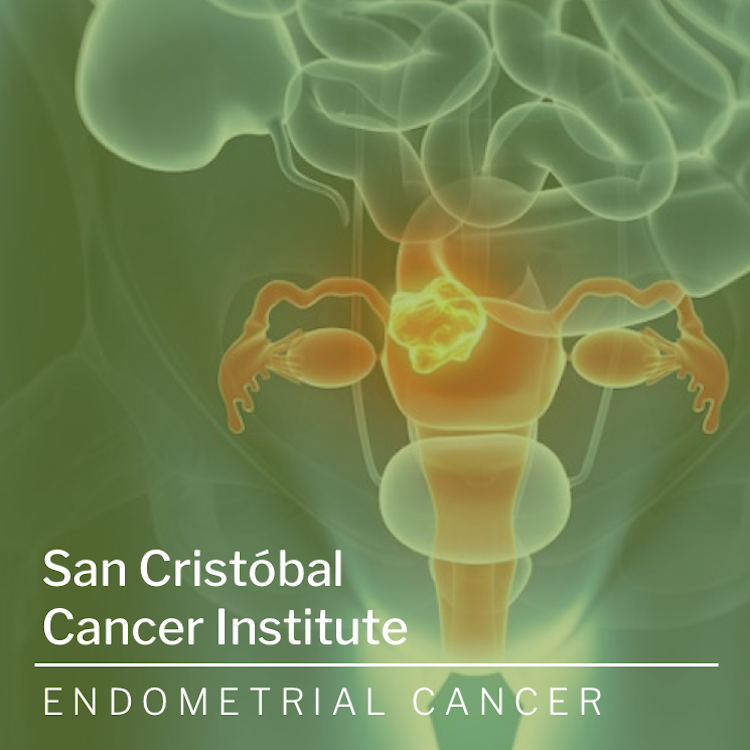
Endometrial Cancer Facts

In the United States, cancer of the endometrium is the most common cancer of the female reproductive organs. The American Cancer Society estimates about 63,230 new cases of cancer of the body of the uterus (uterine body or corpus) will be diagnosed. Its is estimated that about 11,350 women will die from cancers of the uterine body. These estimates include both endometrial cancers and uterine sarcomas. Up to 8% of uterine body cancers are sarcomas, so the actual numbers for endometrial cancer cases and deaths are slightly lower than these estimates. Endometrial cancer affects mainly postmenopausal women. The average age of women diagnosed with endometrial cancer is 60. It is uncommon in women under the age of 45.
Overview
Endometrial cancer begins in the layer of cells that form the lining (endometrium) of the uterus. Endometrial cancer is sometimes called uterine cancer. Other types of cancer can form in the uterus, including uterine sarcoma, but they are much less common than endometrial cancer. Endometrial cancer is often detected at an early stage because it frequently produces abnormal vaginal bleeding, which prompts women to see their doctors. If endometrial cancer is discovered early, removing the uterus surgically often cures endometrial cancer.
Types
The 2 main types of cancer of the uterus are:
- Uterine sarcomas, which start in the muscle layer (myometrium) or supporting connective tissue of the uterus. These include uterine leiomyosarcomas and endometrial stromal sarcomas. These cancers are not covered here, but are discussed in detail in Uterine Sarcoma.
- Endometrial carcinomas, which start in the cells of the inner lining of the uterus (the endometrium). Nearly all cancers of the uterus are this type. These cancers are the focus of the remainder of this information.
Endometrial carcinomas can be divided into different types based on how the cells look under the microscope (histologic types). These include:
- Adenocarcinoma, (most endometrial cancers are adenocarcinomas)
- Carcinosarcoma (discussed more below)
- Squamous cell carcinoma
- Undifferentiated carcinoma
- Small cell carcinoma
- Transitional carcinoma
The most common type of adenocarcinoma is endometrioid cancer. Endometrioid cancers are made up of cells in glands that look much like the normal uterine lining (endometrium). Some of these cancers have squamous cells (squamous cells are flat, thin cells that can be found on the outer surface of the cervix), as well as glandular cells.
Symptoms
Signs and symptoms of endometrial cancer may include:
- Vaginal bleeding after menopause
- Bleeding between periods
- An abnormal, watery or blood-tinged discharge from your vagina
- Pelvic pain
Make an appointment with your doctor if you experience any signs or symptoms that worry you, such as vaginal bleeding or discharge not related to your periods, pelvic pain, or pain during intercourse.
Diagnosis
Tests and procedures used to diagnose endometrial cancer include:
- Pelvic Examination: During a pelvic exam, your doctor carefully inspects the outer portion of your genitals (vulva), and then inserts two fingers of one hand into your vagina and simultaneously presses the other hand on your abdomen to feel your uterus and ovaries. He or she also inserts a device called a speculum into your vagina. The speculum opens your vagina so that your doctor can view your vagina and cervix for abnormalities.
- Transvaginal Ultrasound: Your doctor may recommend a transvaginal ultrasound to look at the thickness and texture of the endometrium and help rule out other conditions. In this procedure, a wandlike device (transducer) is inserted into your vagina. The transducer uses sound waves to create a video image of your uterus. This test helps your doctor look for abnormalities in your uterine lining.
- Hysteroscopy: Your doctor inserts a thin, flexible, lighted tube (hysteroscope) through your vagina and cervix into your uterus. A lens on the hysteroscope allows your doctor to examine the inside of your uterus and the endometrium.
- Biopsy: To get a sample of cells from inside your uterus, you’ll likely undergo an endometrial biopsy. This involves removing tissue from your uterine lining for laboratory analysis. Endometrial biopsy may be done in your doctor’s office and usually doesn’t require anesthesia.
- Dilation and Curettage: If enough tissue can’t be obtained during a biopsy or if the biopsy results are unclear, you’ll likely need to undergo a procedure called dilation and curettage (D&C). During D&C, tissue is scraped from the lining of your uterus and examined under a microscope for cancer cells.
Stages
Once your cancer has been diagnosed, your doctor works to determine the extent (stage) of your cancer. Tests used to determine your cancer’s stage may include a chest X-ray, a computerized tomography (CT) scan, positron emission tomography (PET) scan and blood tests. The final determination of your cancer’s stage may not be made until after you undergo surgery to treat your cancer. Stages of endometrial cancer include:
- Stage I cancer is found only in your uterus.
- Stage II cancer is present in both the uterus and cervix.
- Stage III cancer has spread beyond the uterus, but hasn’t reached the rectum and bladder. The pelvic area lymph nodes may be involved.
- Stage IV cancer has spread past the pelvic region and can affect the bladder, rectum and more-distant parts of your body.
Treatment
Your options for treating your endometrial cancer will depend on the characteristics of your cancer, such as the stage, your general health and your preferences.
Surgery: Surgery to remove the uterus is recommended for most women with endometrial cancer. Most women with endometrial cancer undergo a procedure to remove the uterus (hysterectomy), as well as to remove the fallopian tubes and ovaries (salpingo-oophorectomy). A hysterectomy makes it impossible for you to have children in the future. Also, once your ovaries are removed, you’ll experience menopause, if you haven’t already.
During surgery, your surgeon will also inspect the areas around your uterus to look for signs that cancer has spread. Your surgeon may also remove lymph nodes for testing. This helps determine your cancer’s stage.
Radiotherapy: Radiation therapy uses powerful energy beams, such as X-rays and protons, to kill cancer cells. In some instances, your doctor may recommend radiation to reduce your risk of a cancer recurrence after surgery. In certain situations, radiation therapy may also be recommended before surgery, to shrink a tumor and make it easier to remove. If you aren’t healthy enough to undergo surgery, you may opt for radiation therapy only. In women with advanced endometrial cancer, radiation therapy may help control cancer-related pain. Radiation therapy can involve:
- Radiation from a machine outside your body. During external beam radiation, you lie on a table while a machine directs radiation to specific points on your body.
- Radiation placed inside your body. Internal radiation (brachytherapy) involves placing a radiation-filled device, such as small seeds, wires or a cylinder, inside your vagina for a short period of time.
Hormone therapy: Hormone therapy involves taking medications that affect hormone levels in the body. Hormone therapy may be an option if you have advanced endometrial cancer that has spread beyond the uterus. Options include:
- Medications to increase the amount of progesterone in your body. Synthetic progestin, a form of the hormone progesterone, may help stop endometrial cancer cells from growing.
- Medications to reduce the amount of estrogen in your body. Hormone therapy drugs can help lower the levels of estrogen in your body or make it difficult for your body to use the available estrogen. Endometrial cancer cells that rely on estrogen to help them grow may die in response to these medications.
Chemotherapy: Chemotherapy uses chemicals to kill cancer cells. You may receive one chemotherapy drug, or two or more drugs can be used in combination. You may receive chemotherapy drugs by pill (orally) or through your veins (intravenously). Chemotherapy may be recommended for women with advanced or recurrent endometrial cancer that has spread beyond the uterus. These drugs enter your bloodstream and then travel through your body, killing cancer cells.
Palliative Care: Palliative care is specialized medical care that focuses on providing relief from pain and other symptoms of a serious illness. Palliative care specialists work with you, your family and your other doctors to provide an extra layer of support that complements your ongoing care. Palliative care can be used while undergoing other aggressive treatments, such as surgery, chemotherapy or radiation therapy. When palliative care is used along with all of the other appropriate treatments, people with cancer may feel better and live longer. Palliative care is provided by our skilled team of doctors, nurses and specially trained professionals, aimed at improving the quality of life for people with cancer and their families. This form of care is offered alongside curative or other treatments you may be receiving. Learn more about San Cristóbal Palliative Care.
San Cristobal Cancer Institute offers a wide array of options to help our patients feel calm and supported during the process of screening, diagnosis and treatment, as well as getting back to life after cancer. Browse our alternatives for patients – including financial aid for those eligible – in our Patient Resources section.
If you’d like to learn more about Endometrial Cancer through our San Cristóbal Education Resources, attend our events or learn about our Cancer Center, please contact us.
Knowledge is Power.
Education is one of our strongest tools at San Cristóbal Cancer Institute, empowering patients and their families with complete and updated information about more than a dozen types of cancer and providing first-hand knowledge through our dedicated team of cancer experts. If you’d like to know more, please get in touch with us. We look forward to offering you and your family powerful cancer awareness and the most comprehensive care.
